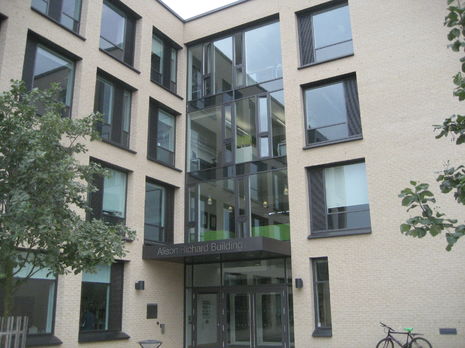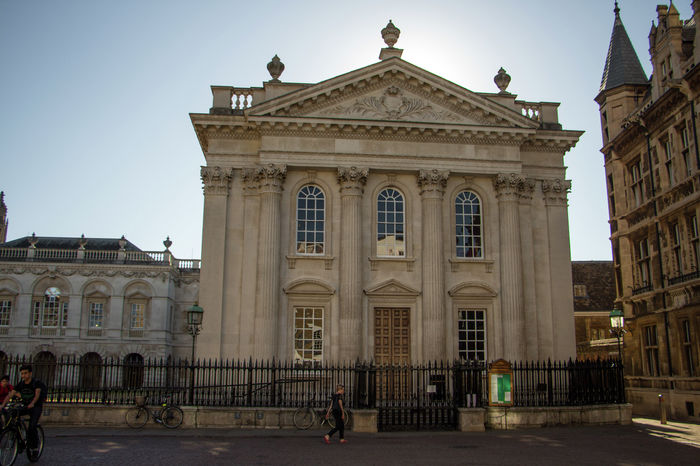Cambridge Centre for Geopolitics criticised over plans to host ‘known denier’ of the Rwandan Genocide
The panel discussion seeks to answer ‘what geopolitical dynamics are driving conflict in the (Democratic Republic of the Congo), why peace is so elusive, and how the Responsibility to Protect can be enforced in this volatile world region.’

An open letter addressed to Vice-Chancellor Stephen Toope and signed by 160 academics, journalists and students, expresses “grave concern” at the decision to platform Judi Rever, who the open letter describes as “a known denier of the 1994 genocide against the Tutsi in Rwanda.”
Rever, author of the controversial book In Praise of Blood, is scheduled to speak on Wednesday 21st April at a panel discussion hosted by the Cambridge Centre for Geopolitics on the subject of “R2P (responsibility to protect) and Crimes Against Humanity in the DRC.”
Rever, the open letter claims, puts forward the “double genocide myth” which “has been shown by countless reports, scholars, journalists, court proceedings and visual evidence to have absolutely no basis in fact.”
Rever’s book, describes alleged war crimes committed by Rwanda’s ruling political party, the Rwandan Patriotic Front (RPF), during the ascent to power in the 1990s. The crimes against Hutus by the Tutsi-led RPF, Rever argues, should also be labeled a genocide.
The Rwandan genocide occured between 7th April and 15th July 1994. According to a BBC estimate, approximately 800,000 Tutsis and moderate Hutus were killed during this time by armed Hutu militias.
In the aftermath the RPF, Rwanda’s current ruling party, led military expeditions into the DRC, which was sheltering refugee Hutu genocidaires, provoking wars in the DRC.
Rever herself claims that she is not a genocide denier, but a “revisionist” arguing that “the official narrative of the genocide stipulates that there is basically one group of people who were targeted that’s the Tutsis. And, in fact, that’s not true. So there is a whole portion of history that’s being concealed, that’s been buried, and that needs to be revised.”
Her investigative work was praised for uncovering crimes committed by the ruling RPF party in their ascent to power. Filip Reyntjens, who is also speaking at the event, praised it for fleshing out in “blood curdling detail” RPF violence that was already known in a general way.
Similarly Helen Epstein, professor of human rights and public health, with a special interest in Uganda and other countries in East Africa, says Rever’s “sources are too numerous and their observations too consistent for her findings to be a fabrication.”
However, her book has been criticised as “sensationalist” and for blurring “the line between investigation and indictment.” In addition, historian Gerard Caplan has argued that there are “too many unnamed informants; too many confidential, unavailable leaked documents; too much unexamined credulity about some of the accusations; too little corroboration from foreigners who were eyewitnesses to history.”
On this basis, the open letter criticises the Cambridge Centre for Geopolitics for “a reckless disregard for upholding factual historical accuracy and debate.”
“African issues and lives are being treated with a flagrant disregard by the University of Cambridge that promotes itself as a global leader in truth and honest.”
A University spokesperson told Varsity: “The University of Cambridge, as a world-leading education and research institution, is fully committed to the principle, and to the promotion, of freedom of speech and expression. The University’s core values are ‘freedom of thought and expression’ and ‘freedom from discrimination’.”
“The University fosters an environment in which all of its staff and students can participate fully in University life, and feel able to question and test received wisdom, and to express new ideas and controversial or unpopular opinions within the law, without fear of intolerance or discrimination.... While debate and discussion may be robust and challenging, all speakers have a right to be heard when exercising their right to free speech within the law.”
Meanwhile Rever told Varsity: “I have never denied the genocide against Tutsis, and never would. These critics have distorted my work and continue to write defamatory statements about me in a bid to deflect from Paul Kagame’s true, historical record. The vast majority of scholars, activists and journalists on the list of signatories are not Rwanda experts.”
Other members of the panel include Richard Kapend, a Senior Lecturer in Criminology and Quantitative Research Methods at the University of Portsmouth; Jason Stearns, the Founder and Chair of the Advisory Board of Congo Research Group at New York University and an Assistant Professor at Simon Fraser University; and Filip Reyntjens, a Professor Emeritus at University of Antwerp.
The panel which will be moderated by Thomas Peak, a Research Associate at the Centre for Geopolitics at the Cambridge University.
 News / Right-wing billionaire Peter Thiel gives ‘antichrist’ lecture in Cambridge6 February 2026
News / Right-wing billionaire Peter Thiel gives ‘antichrist’ lecture in Cambridge6 February 2026 News / Christ’s announces toned-down ‘soirée’ in place of May Ball3 February 2026
News / Christ’s announces toned-down ‘soirée’ in place of May Ball3 February 2026 News / John’s duped into £10m overspend6 February 2026
News / John’s duped into £10m overspend6 February 2026 News / Epstein contacted Cambridge academics about research funding6 February 2026
News / Epstein contacted Cambridge academics about research funding6 February 2026 News / Lucy Cav students go on rent strike over hot water issues6 February 2026
News / Lucy Cav students go on rent strike over hot water issues6 February 2026










